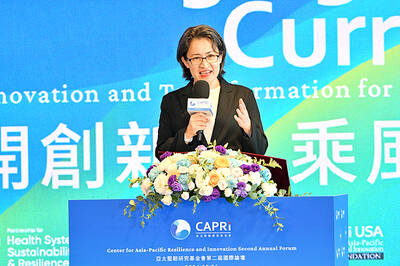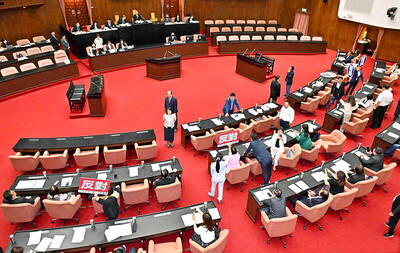Nearly 60 percent of young Taiwanese support independence as national identity is becoming increasingly divided along generational lines, a survey released yesterday by the Chinese-language CommonWealth Magazine (天下雜誌) showed.
Taiwanese are the most divided they have ever been over the issue of independence and national identity, the survey said.
Among respondents aged 30 or younger, nearly 60 percent said they choose independence, while more than 60 percent of those aged 40 or older said they preferred maintaining the “status quo,” the survey said.
Overall, those who favored keeping the “status quo” remained in the majority, although those who support unification with China dropped to 5.5 percent, the lowest proportion since the magazine began the surveys in 2002.
Among those in their 20s, 58.5 percent said they support Taiwanese independence, the survey said.
Asked which name better represents the nation, most of those aged 40 or older said “the Republic of China,” while the majority of those in their 20s and 30s prefered “Taiwan.”
Asked if they identify themselves as Taiwanese, Chinese or both, 61.9 percent said Taiwanese, 28. 3 percent said both and 6.5 percent said Chinese.
The results were similar in the other age brackets, except for respondents in their 20s, among whom 82.4 percent self-identified as Taiwanese, the survey showed.
Across generations, the only consensus appeared to be a shared opposition to Beijing’s “one country, two systems” proposal, the survey showed. Ninety percent of respondents said that “one country, two systems” cannot apply to Taiwan, while 2.8 percent said that it can.
The survey showed that Taiwanese have become more concerned about living in China.
Asked whether they would be willing to work in China, 28.8 percent of respondents said yes, compared with 40.3 percent in a similar survey earlier this year, while 58.6 percent said that they would not work there.
Regarding education across the Taiwan Strait, 67.8 percent said they would not let their children study in China, while 25 percent said they would, the survey showed.
Asked if they think a peace agreement with China would protect Taiwan, 63.4 percent said no, while 23.1 percent said yes, it showed.
The survey collected 1,073 valid samples via telephone interviews from Nov. 21 to Nov. 24. It has a margin of error of 2.99 percentage points. The result was weighted to fit a Taiwanese population profile.

NO-LIMITS PARTNERSHIP: ‘The bottom line’ is that if the US were to have a conflict with China or Russia it would likely open up a second front with the other, a US senator said Beijing and Moscow could cooperate in a conflict over Taiwan, the top US intelligence chief told the US Senate this week. “We see China and Russia, for the first time, exercising together in relation to Taiwan and recognizing that this is a place where China definitely wants Russia to be working with them, and we see no reason why they wouldn’t,” US Director of National Intelligence Avril Haines told a US Senate Committee on Armed Services hearing on Thursday. US Senator Mike Rounds asked Haines about such a potential scenario. He also asked US Defense Intelligence Agency Director Lieutenant General Jeffrey Kruse

INSPIRING: Taiwan has been a model in the Asia-Pacific region with its democratic transition, free and fair elections and open society, the vice president-elect said Taiwan can play a leadership role in the Asia-Pacific region, vice president-elect Hsiao Bi-khim (蕭美琴) told a forum in Taipei yesterday, highlighting the nation’s resilience in the face of geopolitical challenges. “Not only can Taiwan help, but Taiwan can lead ... not only can Taiwan play a leadership role, but Taiwan’s leadership is important to the world,” Hsiao told the annual forum hosted by the Center for Asia-Pacific Resilience and Innovation think tank. Hsiao thanked Taiwan’s international friends for their long-term support, citing the example of US President Joe Biden last month signing into law a bill to provide aid to Taiwan,

China’s intrusive and territorial claims in the Indo-Pacific region are “illegal, coercive, aggressive and deceptive,” new US Indo-Pacific Commander Admiral Samuel Paparo said on Friday, adding that he would continue working with allies and partners to keep the area free and open. Paparo made the remarks at a change-of-command ceremony at Joint Base Pearl Harbor-Hickam in Hawaii, where he took over the command from Admiral John Aquilino. “Our world faces a complex problem set in the troubling actions of the People’s Republic of China [PRC] and its rapid buildup of forces. We must be ready to answer the PRC’s increasingly intrusive and

STATE OF THE NATION: The legislature should invite the president to deliver an address every year, the TPP said, adding that Lai should also have to answer legislators’ questions The Chinese Nationalist Party (KMT) yesterday proposed inviting president-elect William Lai (賴清德) to make a historic first state of the nation address at the legislature following his inauguration on May 20. Lai is expected to face many domestic and international challenges, and should clarify his intended policies with the public’s representatives, KMT caucus secretary-general Hung Meng-kai (洪孟楷) said when making the proposal at a meeting of the legislature’s Procedure Committee. The committee voted to add the item to the agenda for Friday, along with another similar proposal put forward by the Taiwan People’s Party (TPP). The invitation is in line with Article 15-2